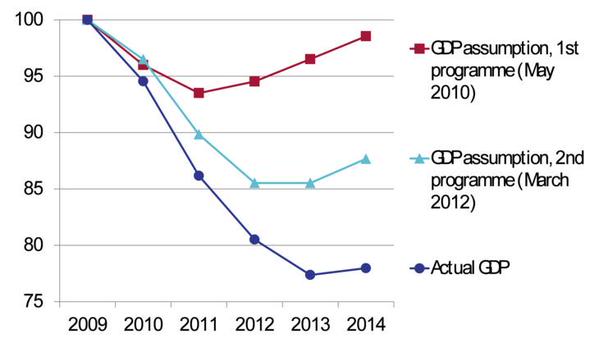We are all familiar with the story of the Emperor’s new clothes, yes? The emperor is sold “clothes” which are imaginary, wanders around naked, and everyone pretends he’s clothed until a child points out he’s naked?
Commenter MFI pointed out yesterday that Oliver Blanchard, the chief IMF economist, had made the following assumptions about Greece in July of last year:
1. The Greek economy would grow by three percent both this year and every other year until 2020.
2. Inflation would average between one percent and two percent a year both this year and every other year until 2020.
3. The Greek government would run a primary budget surplus of four percent a year.
As MFI points out, at best, these assumptions are delusional. Greece is in forced austerity; they aren’t going to make these targets.
Edward Harrison has been on the same beat:
…the IMF revised down its estimate for Greece’s 2014 gross domestic product by some 22 percent in the space of 18 months.
And:

Greek GDP forecasts collated by Edward Harrison
As Edward and MFI note, these are damning.
But they are of a piece with estimates of the effects of austerity. Austerity is a reduction in demand. Reduction in demand leads to economic activity being lower than it would be otherwise. Governments who spend less money buy less stuff, this is indisputable. Then, everybody has less money and almost certainly buys less stuff as a result, thus reducing the size of the economy.
Meanwhile, money has been given to rich people and corporations who, mostly, have not spent it and when they have spent it, they’ve spent it on luxury goods.
Austerity cannot help but reduce GDP. This is what it is designed to do.
But it is sold as a way to make economies better. You cannot, as a government or quasi-governmental agency (like a central bank or the IMF), admit that austerity will make the economy worse and many of the people in an economy to which it is applied worse off.
The question, then, is the old one. “Evil, or stupid?” Is Blanchard, for example, such an ideologue that he believes the assumptions which allow him to forecast a better economy under austerity? Are the other economists who have made similar forecasts similarly stupid? I mean, assuming moderate stupidity (normal), they might have believed it in 2008 or even 2010, but we’ve seen the effects of austerity since the financial crisis, and that’s going on seven years.
These people are either very stupid or are doing what they feel they must to keep their jobs and their membership in a very lucrative club. If they were to say, “No, these policies don’t work,” would they keep their jobs?
It’s not that we don’t know austerity doesn’t work, if by “work” you mean “improve the economy more than not being in austerity would,” we do. It’s only ever worked in theory by making very dubious assumptions, and it has never worked in practice.
So, at this point, if you believe austerity works, you’re either an extraordinarily blind ideologue, or you’re crooked, on the payroll, and know what you’re doing.
Austerity is the policy that the IMF, most central authorities, and all neo-liberal parties (which means almost all parties in power in the EU) believe in. It is a policy which works: It puts public assets up for sale which would not be otherwise, so that rich, private investors can buy them up. Combined with “unconventional monetary policy” (the two are Siamese twins), it makes sure that the rich get richer, corporations are flush with cash they do not use to hire workers, and that everyone who isn’t rich, or part of the close retainer class, loses.
You really, really don’t want to fall out of that close retainer class. They are paid very well (Lagarde receives a six hundred thousand per annum salary, entirely tax free), they are treated well, and their future job prospects are secure, as are those of their families.
The Emperor, in other words, is bloody well wearing clothes. If you want to remain the chief economist of the IMF, you had best remember that.
Austerity does what it was meant to do. I predicted its course in 2009, as did many others, and it has performed exactly as expected.
It is working: Its advocates are its beneficiaries. The people who enforce it are benefiting as well and there is a sufficient constituency, both at the elite level and the common level, to keep it going (remember, Cameron was re-elected in the UK, and Labour got many votes when its essential promise was “slightly kinder austerity”). A few countries (Germany, for example) are winning under this policy regime.
So austerity will continue. It is a successful policy which does what it is supposed to do and which has a constituency sufficient for its continuation. It must be sold by lies, to be sure, and many of those who sell those lies probably believe them, because they personally benefit from pushing austerity and people prefer to believe that they are honest and working for good.
Others, I am certain, know it is being sold with lies. Who falls into which camp? Who knows? The end affect is the same.
The Emperor has no clothes and beatings will continue until morale improves.
If you enjoyed this article, and want me to write more, please DONATE or SUBSCRIBE.

